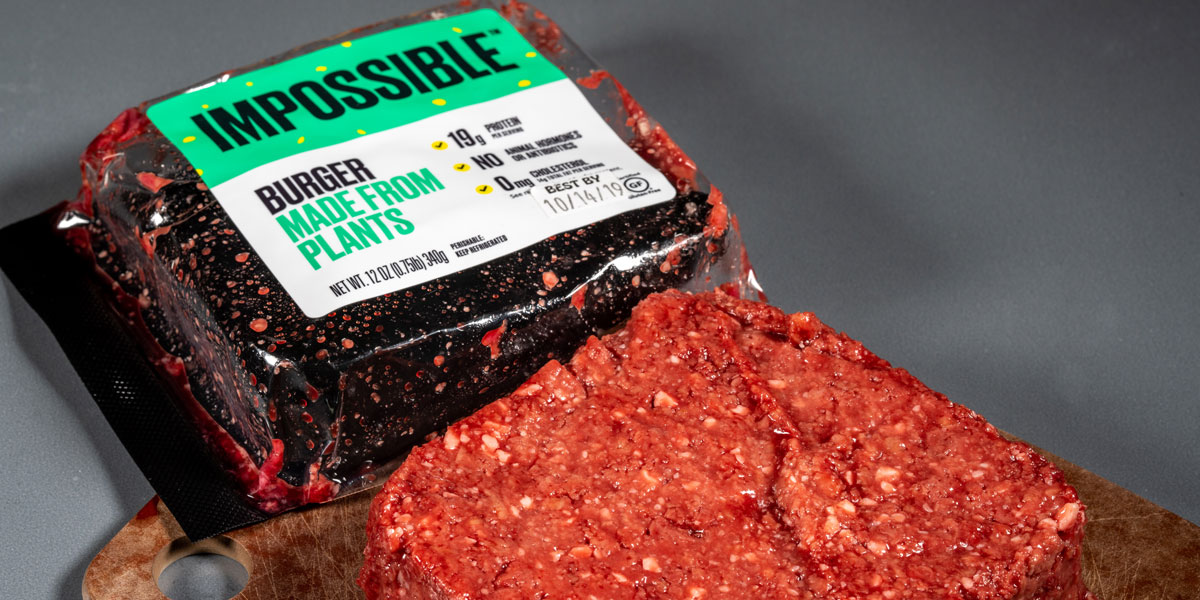 Public transparency is threatened also for new GMOs. Report by Testbiotech
Public transparency is threatened also for new GMOs. Report by Testbiotech
The US company Impossible Foods has used genetic engineering (GE) to develop a blood-like dye that imitates the taste and appearance of meat. The protein, which is similar to the blood pigment haemoglobin, is originally found in the roots of soybean plants. The company produces the substance using GE yeast, and now wants to add it to its meat substitute products in the EU. Currently, the European Food Safety Authority (EFSA) is withholding basic information on this genetically engineered soy leghemoglobin, even though Testbiotech has submitted several official requests.
EFSA, which is the body responsible for risk assessment, published its review report on soy leghemoglobin in November 2024. However, relevant parts of the opinion which referred to confidential business information were redacted, thus making the data on exactly how the DNA of the product and the yeast were modified inaccessible to external experts or the general public. This is in contrast to EU legislation, which states that all risk-relevant data must be made publicly available.
Amongst other things, this unusual procedure has implications for the public consultation required for authorisations, which is meant to contribute to the transparency of the process and product safety. Unless the redacted data is made available, it is not possible, for example, to make scientifically sound comments on the molecular biological analyses or the safety of the products in the consultation process. In addition, it means that independent detection methods cannot be developed to identify any food contamination from the genetically engineered yeast.
Testbiotech has since December 2024 repeatedly requested the publication of the unredacted version of the EFSA opinion, both from the EFSA itself and the European Commission. The result of the months-long tug-of-war: a new version of the text edited by EFSA in which only slightly less text was redacted compared to the official version. The authority also made other documents available, but these also contained extensive redactions.
The Commission has not yet made a final statement on the case. It is still working on a decision. A question submitted by the European Parliament has also not yet been answered, even though the deadline has expired.
Testbiotech believes this case to be a dangerous precedent which must also be seen in the context of the Commission’s aim to deregulate plants obtained from new genetic engineering (NGT). In the case of NGT plants, access to information might also be hindered extensively. For example, according to the Commission proposal, there will be no labelling, traceability or monitoring requirements. In countries where NGT plants are already deregulated, such as the US, the published documents frequently do not contain any precise information about the properties or risks posed by the products.
The Parliament, on the other hand, is calling for the labelling and monitoring of these kinds of plants. However, it is doubtful whether this position can be upheld in the trilogue between the Commission, Member States and the Parliament, which is currently starting. Testbiotech fears that the redacted documents on the GM burger are just a foretaste of a radical change of the EU’s course in regard to the safety and transparency of genetically engineered organisms.
Further information
The new version of the EFSA opinion
Testbiotech request on ‘Askthe EU’
The letters from the Commission
Question by the European Parliament
Latest news on the planned deregulation of NGT plants
Source: Testbiotech
See also GMWatch's article and submission to the public consultation on Impossible Foods' soy leghemoglobin










